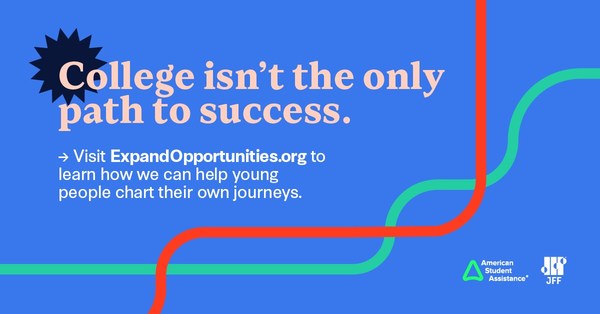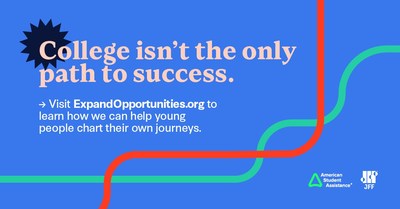American Student Assistance® (ASA) and Jobs for the Future (JFF) report finds growing support for non-degree pathways, but calls for policy and funding investments to achieve widespread acceptance
BOSTON, Oct. 18, 2022 /PRNewswire/ -- Today, American Student Assistance® (ASA) and Jobs for the Future (JFF) are releasing two new reports that demonstrate the growing momentum of education pathways beyond the traditional college degree. Non-degree Pathways: A DC Insider's Perspective demonstrates policy insiders' appetite to leverage federal policy to expand access to non-degree pathways. A Universe of Possibilities: Education to Career Pathways for the Future of Work compiles data on hundreds of education-to-career initiatives to identify innovative programs across the US working to solve some of the most pressing challenges facing students and employers today.
"With college enrollment on the decline, and employers facing an ongoing struggle to fill jobs with talented candidates, it's clear the college degree should no longer be the sole ticket to success," said Jean Eddy, president and CEO of ASA. "We hope to equip students, employers, and policymakers with the information on the efficacy of non-degree options and inspiration to tackle any perceived risk to exploring the pathway, career, or talent that's right for them."
To better understand changing public opinion of higher education and other education and training options after high school, ASA and JFF partnered with Morning Consult to survey a select but diverse group of policy influencers working in Washington, DC, on their perceptions of expanded educational pathways. While the report shows broad support for diverse non-degree pathways, it also finds areas of divergence along party lines:
- There is bipartisan support for expanding non-degree paths. A vast majority of DC Insiders agree that non-degree pathways can diversify options for students (93%) and provide skills to meet employer needs (89%). Likewise, most respondents (89%) believe more students should consider non-degree postsecondary education pathways.
- Concerns over program quality differ by party line. While nearly 80% of DC Insiders strongly or somewhat agree that non-degree pathways offer quality options to students, Democrats (41%), Independents (39%) are much less likely to strongly agree than Republicans (70%). In fact, the survey finds concerns over program quality appear to be the largest impediments to providing federal funding for non-degree programs.
- Policy insiders agree on the need for action. Eighty-nine percent of DC Insiders want legislative support for the expansion of non-degree pathways to increase in the next five years and 78% want to see a boost in federal funding for these pathways.
"It's reassuring that policymakers on both sides of the aisle see the value in a wide range of education-to-career pathways that can offer young people career growth and financial freedom," said Maria Flynn, president and CEO of JFF. "But in order for all Americans to achieve economic mobility and access to good paying jobs, we need policy commitments and funding investments that will allow us to truly scale the availability of high-quality non-degree pathways, and ultimately create the kind of diverse opportunities that reflect the diversity of our nation's workforce."
ASA and JFF's second complementary report, A Universe of Possibilities: Education to Career Pathways for the Future of Work, maps the most innovative training and education opportunities for young people ages 18-25, based on data gathered on more than 400 education-to-career pathways across the country. Through this research, A Universe of Possibilities finds:
- A hybrid approach to education models is driving innovation. Programs are moving beyond foundational models (e.g., apprenticeships and long-standing career and technical education programs) toward unique models that use different combinations of pathway building blocks.
- Employers are already engaging with these programs. As the labor market has tightened, employers are playing increasingly active roles in developing and supporting training programs that can serve as talent pipelines for their organizations and their industries.
As part of their partnership to build a coalition of support for expanded education-to-career opportunities, ASA and JFF are launching the ExpandOpportunities.org, a new digital hub that houses insights, research, and resources on education-to-career pathways. The online hub provides a collection of insightful resources and original research, including A Universe of Possibilities, Non-degree Pathways, and Degrees of Risk, a study of Gen Z and employer attitudes released earlier this year, to help equip learners, employers, and those developing policy with information and tools to help them assess and navigate the many pathways to success.
American Student Assistance® (ASA) is a national nonprofit committed to helping students know themselves, know their options, and make informed decisions to achieve their education and career goals. ASA believes all students should have equitable access to career readiness learning, starting in middle school, so they can develop a plan for their future. ASA fulfills its mission by providing digital-first programming, resources, and experiences, including Futurescape, directly to millions of students, in addition to support for educators and intermediaries. To learn more about ASA, visit www.asa.org/about-us.
JFF is a national nonprofit that drives transformation in the American workforce and education systems. For nearly 40 years, JFF has led the way in designing innovative and scalable solutions that create access to economic advancement for all. www.jff.org.
SOURCE American Student Assistance (ASA)


